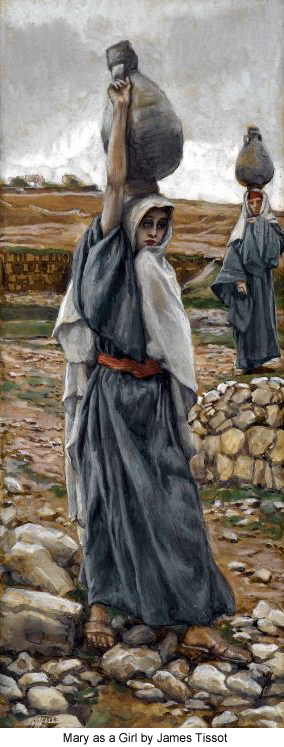
(122:5.2) Mary 's temperament was quite opposite to that of her husband. She was usually cheerful, was very rarely downcast, and possessed an ever-sunny disposition.
Mary indulged in free and frequent expression of her emotional feelings and was never observed to be sorrowful until after the sudden death of Joseph. And she had hardly recovered from this shock when she had thrust upon her the anxieties and questionings aroused by the extraordinary career of her eldest son, which was so rapidly unfolding before her astonished gaze. But throughout all this unusual experience Mary was composed, courageous, and fairly wise in her relationship with her strange and little-understood first-born son and his surviving brothers and sisters.
Jesus derived much of his unusual gentleness and marvelous sympathetic understanding of human nature from his father; he inherited his gift as a great teacher and his tremendous capacity for righteous indignation from his mother. In emotional reactions to his adult-life environment, Jesus was at one time like his father, meditative and worshipful, sometimes characterized by apparent sadness; but more often he drove forward in the manner of his mother's optimistic and determined disposition. All in all, Mary's temperament tended to dominate the career of the divine Son as he grew up and swung into the momentous strides of his adult life. In some particulars Jesus was a blending of his parents' traits; in other respects he exhibited the traits of one in contrast with those of the other.
From Joseph Jesus secured his strict training in the usages of the Jewish ceremonials and his unusual acquaintance with the Hebrew scriptures; from Mary he derived a broader viewpoint of religious life and a more liberal concept of personal spiritual freedom.
The families of both Joseph and Mary were well educated for their time. Joseph and Mary were educated far above the average for their day and station in life. He was a thinker; she was a planner , expert in adaptation and practical in immediate execution. Joseph was a black-eyed brunet; Mary, a brown-eyed well-nigh blond type.
Had Joseph lived, he undoubtedly would have become a firm believer in the divine mission of his eldest son. Mary alternated between believing and doubting , being greatly influenced by the position taken by her other children and by her friends and relatives, but always was she steadied in her final attitude by the memory of Gabriel's appearance to her immediately after the child was conceived.
Mary was an expert weaver and more than averagely skilled in most of the household arts of that day; she was a good housekeeper and a superior homemaker.
Both Joseph and Mary were good teachers, and they saw to it that their children were well versed in the learning of that day.
(122:5.10) The larger part of Joseph's family became believers in the teachings of Jesus, but very few of Mary's people ever believed in him until after he departed from this world. Joseph leaned more toward the spiritual concept of the expected Messiah, but Mary and her family, especially her father, held to the idea of the Messiah as a temporal deliverer and political ruler. Mary's ancestors had been prominently identified with the Maccabean activities of the then but recent times
Joseph held vigorously to the Eastern, or Babylonian, views of the Jewish religion; Mary leaned strongly toward the more liberal and broader Western, or Hellenistic Hellenistic, interpretation of the law and the prophets


